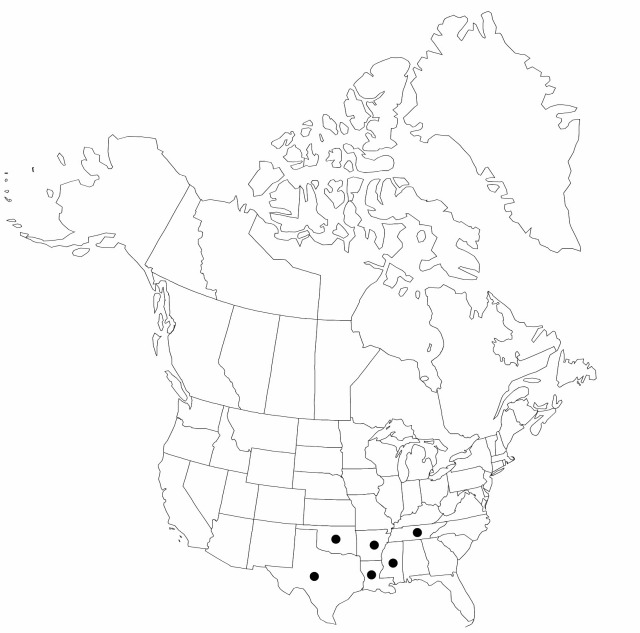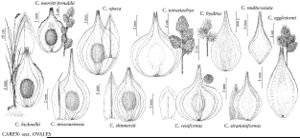Carex hyalina
Boston J. Nat. Hist. 5: 112. 1845.
Plants ± colonial; rhizomes short-creeping between patches. Culms 25–95 cm; vegetative culms numerous, conspicuous, with 15–35 leaves, 3-ranked. Leaves: sheaths with adaxial hyaline band, summits U-shaped, prolonged 0.4–1.6 mm beyond collar; distal ligules 2–3.5 mm; blades 4–7 per fertile culm, pleated, ± auriculate at collar, 9–20 cm × 1–2.7 mm. Inflorescences open or dense, light green to light brown, 1.3–4 cm × 8–12 mm; proximal internode 2–9 mm; 2d internode 2–5 mm; proximal bracts scalelike or with bristle tips to 3.7 cm. Spikes 2–4(–6), distant, distinct, clavate-ovoid, 6–18 × 6–12 mm, base attenuate on terminal spike, truncate on lateral spikes, apex rounded. Pistillate scales silvery white to pale brown, narrow green to brown midstripe, narrowly ovate, 2.3–3.8 mm, as long as and narrower than perigynia, apex obtuse to acute. Perigynia widely spreading, green to pale brown, conspicuously 5–10-veined abaxially, conspicuously 3–7-veined adaxially, elliptic to nearly orbiculate, plano-convex to biconvex, (4–)4.5–6.6 × 2.2–3.5 mm, 0.6 mm thick, sometimes finely papillose, margin flat, including wing 0.8–1.3 mm wide; beak white or pale brown at tip, flat, ciliate-serrulate, abaxial suture usually inconspicuous, distance from beak tip to achene 2–3 mm. Achenes narrowly oblong-lanceolate, 1.8–2.6 × 0.9–1.2 mm, 0.6 mm thick. 2n = 74.
Phenology: Fruiting spring.
Habitat: Bottomland woods on clayey and silty soils, riverbanks
Elevation: 10–100 m
Distribution

Ark., La., Miss., Okla., Tenn., Tex.
Discussion
Selected References
None.
